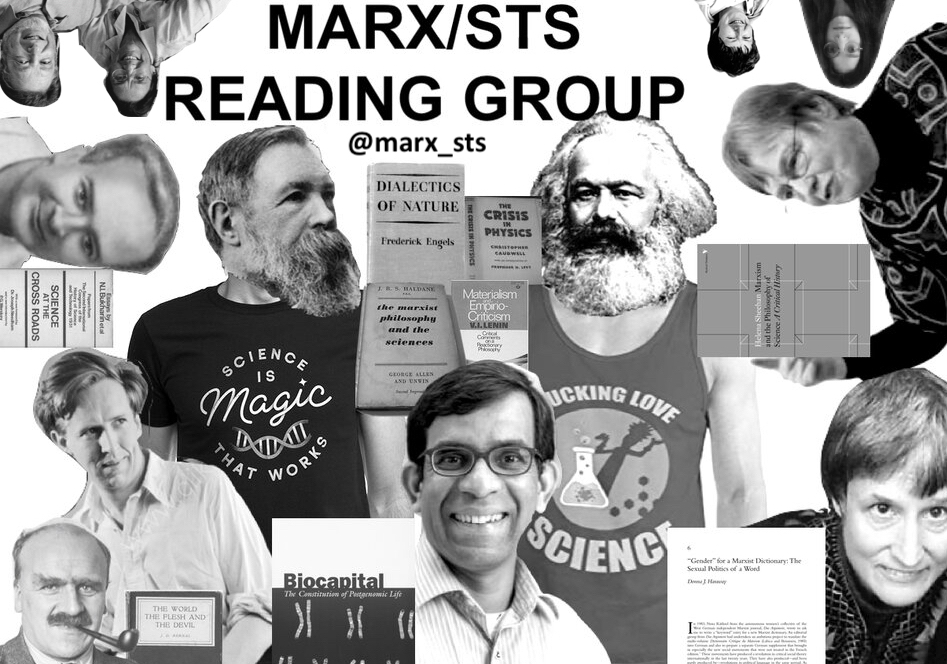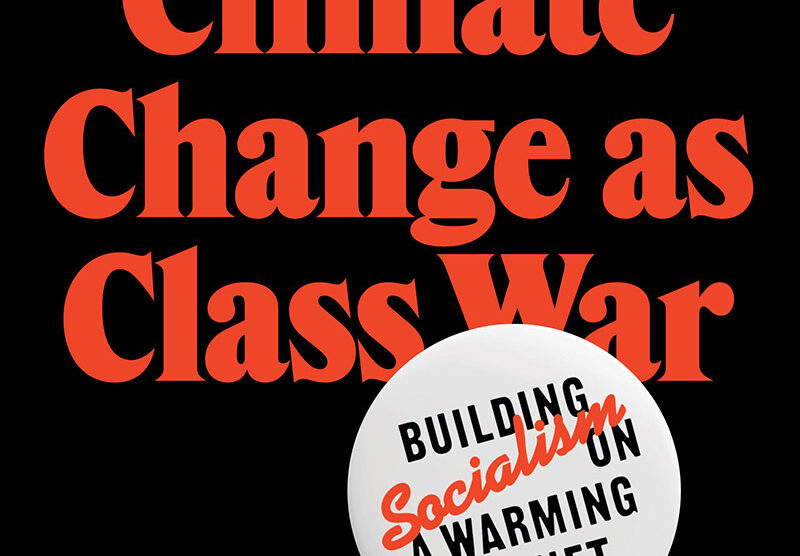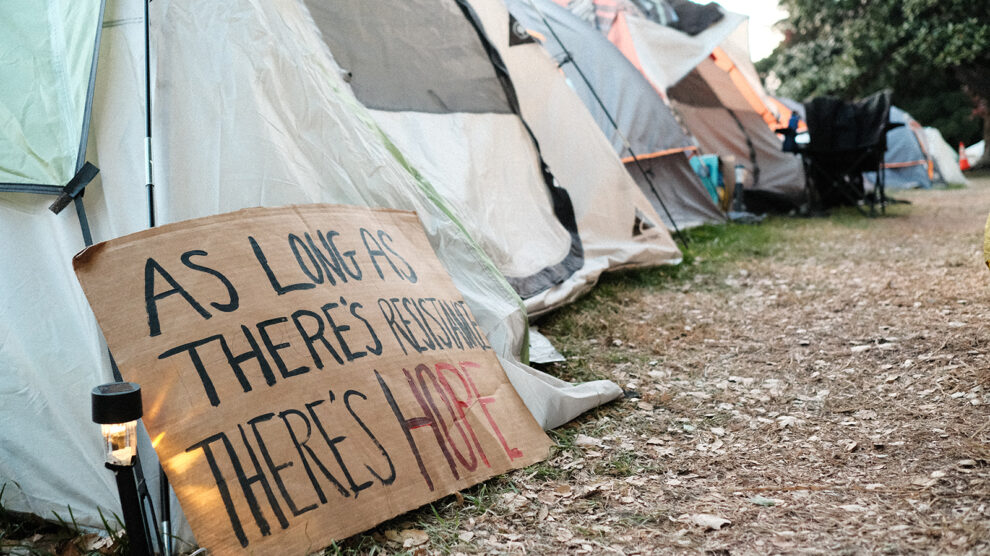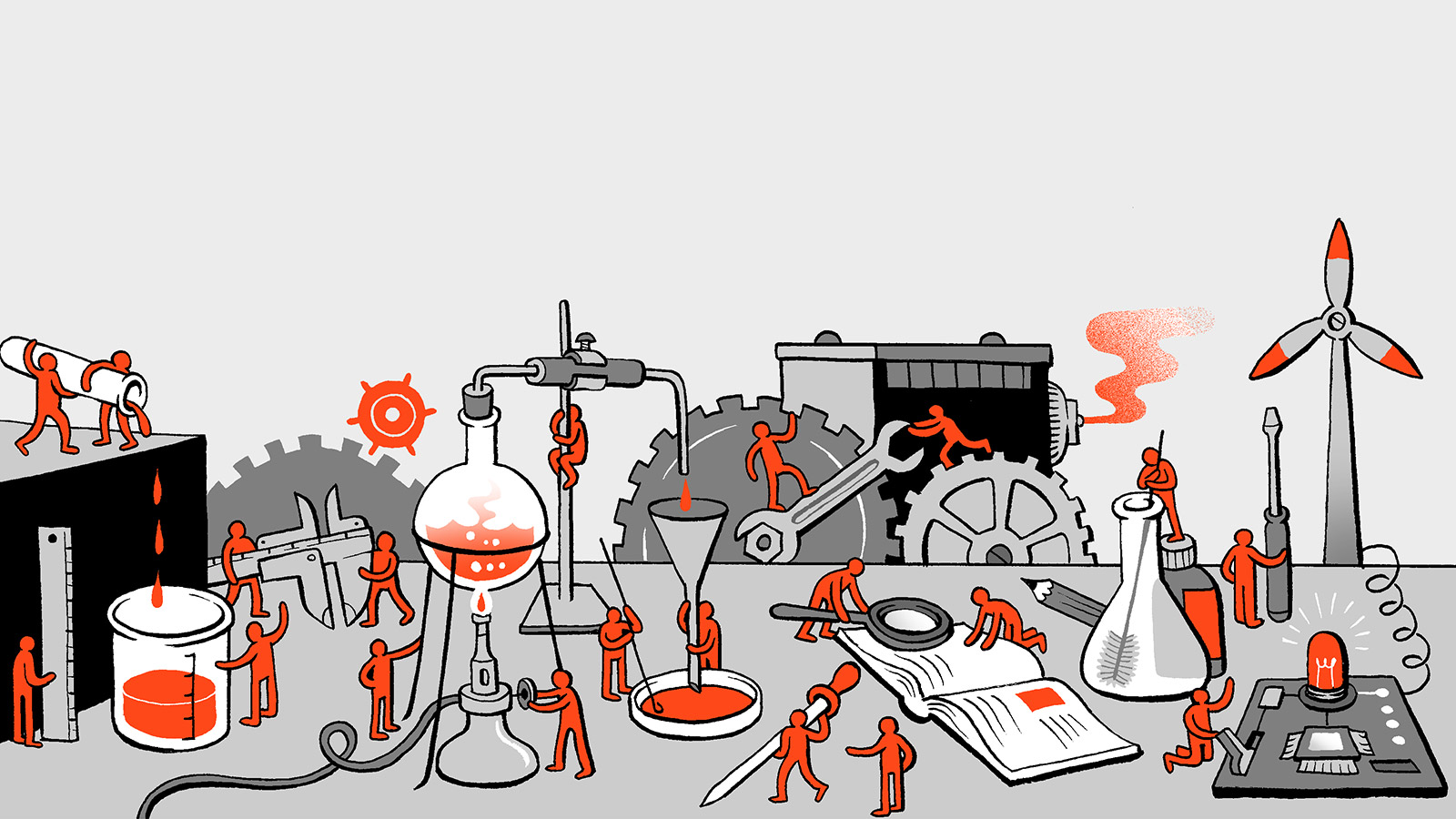Autumn 2021 Organizing Reports
Volume 24, Number 2, Don’t Be Evil
Jump to:
You can find previous organizing reports here.
Santa Cruz
By Azucena Lucatero | Contact: sftp.santacruz@gmail.com
The Santa Cruz chapter of SftP has recently focused on two major topics: police technology and abolition, and pesticide justice.
In October of 2020, Abolitious, a Santa Cruz-based BIPOC study group, hosted a Santa Cruz Abolition Fair with the goals of advocating for a world without police or prisons, connecting with and promoting the work of local organizations with similar abolitionist visions, and sharing abolitionist educational material. Our chapter contributed a public talk titled “Surveilling the Surveillants: Radical Science and the Abolition of Policing Algorithms,” in which we discussed policing algorithms, such as predictive policing and facial recognition, and how they reflect and perpetuate racist assumptions. We also provided examples of abolitionist technologies that disrupt racist algorithms, prevent incarceration, and surveil the surveillants. Finally, we presented our own analysis of Santa Cruz police department citations, revealing spatial and temporal patterns in police interactions with the local houseless population against a backdrop of changing city policies on houseless encampments. Our main finding was that the local houseless encampment had a protective effect on the houseless population, as police citations of houseless people dropped during the months the camp was operating. The slides from our talk and materials provided by other community groups are available at abolitious.org. More recently, our chapter contributed a public comment against the City of Santa Cruz’s Temporary Outdoor Living Ordinance, which criminalizes most camping by the houseless population. After spending some time reading together from Richard Levins and Richard Lewontin’s The Dialectical Biologist, our chapter has begun to plug into pesticide action efforts in our region, the California central coast. Our members have been participating in Safe Ag Safe Schools meetings, which bring together a coalition of residents, farmworkers, educators, and union members working to reduce pesticide exposure in the region. We have been supporting the coalition in its ongoing Right to Know campaign, which demands transparency about what and when pesticides are applied.
Our chapter is also now working on an article on pesticide racism for the local DSA magazine and possibly other publications. We currently hold monthly chapter meetings with follow up meetings and work parties scheduled as needed to advance chapter projects.
Back to Top
Western Mass
Making Science Work for Social Justice: Building an Equitable Community Agenda for STEM
By Seth Tuler | Contact: westernmass@scienceforthepeople.org / Facebook
Western Mass Science for the People and the Truth School (https://truthschool.org) organized a series of workshops in 2020 and 2021 about what solidarity science means. Our goal was to critique the role of science in our lives and to show how science can be more responsive to real needs. Our workshop series supports conversations between people working in STEM and community members about the role of science and technology in solving problems that undermine well-being and in breaking down structures of marginalization, racism, and poverty.
We hosted the third workshop of the series on April 10, 2021 to continue exploring the principles of solidarity science and what it means for collaborations and coalitions among our community of STEM workers, including teachers at all levels, university staff, students, and community activists. Forty people participated.
The first half of our third workshop included presentations by organizers involved in climate justice, harm reduction, housing, environmental health, racial equity, community medical care, and radical science education. These presentations illustrate how solidarity science solves problems in local communities by being inclusive and recognizing the significance of social, political, economic, and cultural contexts. We want to shift power into the hands of community members in order to direct scientific investigations for the collective good by leveraging all of our resources.
In the second half of the workshop, participants brainstormed and identified community action items in small breakout groups. A lot of great ideas emerged, including potential areas of research and action, as well as ways that STEM workers can better work with community members in an atmosphere of trust and cooperation. Participants highlighted the need to make information available by giving community members access to STEM data, research, and knowledge; presenting STEM knowledge in accessible language and translating STEM material into other languages. They also emphasized the need to expose how STEM has been—and still is—misused to promote racism, war, and other injustices, while also sharing examples of how STEM can be used to challenge existing ideologies and practices that bolster institutional, social, political, and economic power structures.
Following the last workshop, the members of Western Mass Science for the People pored over the notes from the breakout groups and distilled the themes into a Community Agenda for STEM. Check it out on our website! We envision multiple purposes for this document: as a challenge to STEM professionals to recognize the community’s right to decide what science should and should not do; as a guide to “doing science” in partnership with a community; as encouragement to grassroots organizations to identify community needs and barriers to rightful access to scientific knowledge; and as a resource for our chapter and any other group in choosing future projects that make science work for social justice.
Back to Top
Twin Cities
By Julia Brokaw and Andrew Butts | Contact: scienceforthepeople.twincities@gmail.com / Facebook
Greetings from the Twin Cities Chapter of Science for the People! It has been a turbulent, challenging, and generative year for our members and our chapter, personally and organizationally.
Policing and Anti-Racism
Minneapolis was the epicenter of the uprisings following the police murders of George Floyd and Daunte Wright. Some of us supported the community in the streets, and all of us intensified our organizing against policing and racism while deepening our practice and knowledge of abolition.
Our chapter organized a discussion and workshop of scientists for the national June 10, 2020 #ShutDownSTEM strike. This action uplifted ongoing organizing from individual members and a commitment to lasting engagement around racism and policing within the University of Minnesota. Members of our chapter at the University of Minnesota have been coordinating across departments to agitate against the neoliberal, racist, and colonial structure of our higher education institutions. Through this struggle, we participated in a coalition effort to prevent both a faux populist and a union-busting Board of Regent candidate from getting elected; and members published an open letter calling out their research department for persistent racism and pushing for the adoption of an anti-racist framework (Self-Awareness, Action, Accountability, and Support, or SAAS).1
Movement to Stop Line 3 and Missing and Murdered Indigenous Women and Relatives (MMIWR)
We have continued to engage in the coalition to stop the Enbridge Line 3 pipeline, a 1,097 mile crude oil pipeline extending from Edmonton, Alberta to Superior, Wisconsin. In November 2020, state agencies granted final permits to Enbridge, despite over seven years of public opposition. We decided to focus our efforts on media, direct action support, and regulatory oversight. The media team has created sharable and informative materials, including production of a short video called “Line 3 Hot Potato,” which highlights the failures and conflicts of interest in the regulatory process. We also collaborated on an interactive “story map” outlining the Line 3 and Missing and Murdered Indigenous Women and Relatives (MMIWR) struggle, and curated a “Myth v Fact” sheet to debunk common industry and agency propaganda. The regulatory oversight team has connected with Watch the Line, a volunteer collective monitoring pipeline construction. In March 2021, we sent a fifteen person delegation to support frontline resistance camps and to capture video footage of the construction for media production. We are currently planning a second delegation in June as part of the Treaty People Gathering.2
The root structure of climate injustice also promotes gender and sexual violence, sex trafficking, and the epidemic of MMIWR. Wherever there are fossil fuel expansion projects, there is a spike in sex trafficking and violence against Indigenous women; and Line 3 is no different. In September 2020, we co-hosted a virtual panel with Taysha Martineau and Mysti Babineau, Indigneous leaders in the struggle against MMIWR and Line 3. The panel was co-planned with both Taysha and Mysti as well as the Twin Cities Logistics Collective, a mutual aid group active in supporting frontline water protectors. Twenty people joined for the virtual event and we provided honoraria to the panelists.
Organizing at the speed of relationships
This past year, our chapter has also supported each other individually through tough times. We’ve said goodbye to friends moving to new places, welcomed babies into the world, and grieved losses. We continue to strive and struggle to hold space in our activism, apart from action or planning, to deepen our relationships with one another, navigate conflict, and foster personal growth.
Back to Top
Ann Arbor
By Nizar Ezroura | Contact: sciforthepeople@umich.edu
In the past, our chapter has worked to “counter-recruit” corporate employers, a tactic that involves distributing oppositional material during promotional events, such as career fairs or guest speakers, for example, with texts that counter greenwashing and pro-fossil fuel interests’ propaganda, disseminated on university grounds by Bank of America, Dow, and Morgan Stanley. This year, when University of Michigan announced an engineering career fair featuring Raytheon and BP on January 26th, we shifted away from counter-recruiting and instead offered an outwardly focused panel titled STEM for the Common Good on March 4th.
This framing was inspired by Bargaining for the Common Good in labor organizing, with the hope of introducing an anti-capitalist, anti-war, and pro-labor perspective in our approach to an alternative STEM career fair. We invited panelists via SftP networks who are involved in STEM-related activism outside of academia, in journalism, nonprofit work, and environmental justice organizing. The outreach for this panel was done in collaboration with student advocacy groups such as the graduate student labor union (Graduate Employees’ Organization AFT-MI Local 3550, AFL-CIO), the local Society of Women in Physics, and the Society of Hispanic Professional Engineers. We had an active audience of about fifty to sixty, mostly university students, for the panel portion, which then broke off into more in-depth discussions with the panelists. The panelists touched specifically on the political stakes in the practice of science through the lens of ethical and professional dilemmas in prospective STEM careers. We introduced SftP’s analytical frame for relating professional and ethical concerns in STEM careers to questions of labor, power dynamics, and political forces. Given the time and format constraints, we plan in future panels to delve further into these aspects, especially emphasizing the role of capitalism, neoliberalism, and corporate power in shaping the very landscape of jobs in STEM. For that, we would reach out to panelists with perspectives from Science and Technology Studies, as well as from a first-person involvement in questions of labor organizing in science and tech workplaces.
Our chapter has also been involved in advocating for the University of Michigan to divest from all of its fossil fuel investments (an estimated $1.5 billion), building on the previous years’ efforts that resulted in the university regents announcing a freeze on new fossil fuel investments in 2021. That victory was the product of a broad coalition of climate activists on campus working with the One University Campaign, a student group fighting for funding equity across the university’s three campuses. We have found that a broad coalition is essential, as the University’s administration has in the past used the proposed tuition guarantee policy to pit lower-income students and climate justice activists against each other. Our divestment campaign also included making our case by highlighting the need for subsequent investment at the community level in matters of public health and environmental and carceral justice. The expectation throughout has been to continue to join forces with local activist and progressive forces in labor on campus, as well as in the surrounding community, to push for more democratic control of the public university’s endowment, investments, and management decisions. We have been inspired by parallel campaigns in other universities to demand justice, liberation, and independence from their otherwise entrenched neoliberal and carceral appendages.
Back to Top
Marx/STS
By Owen Marshall | Contact: omarshall@cornell.edu / Twitter: @Marx_STS
The Marx/STS reading group has been meeting online regularly since Spring 2020 to discuss work at the intersection of Marxist theory and Science & Technology Studies (STS). We meet approximately twice per month via Zoom and maintain a shared document for readings and other resources. New members are always welcome!
Our readings include classic works, new scholarship, and works-in-progress provided by group members. In a recent meeting, for example, we read work by J. Posadas alongside A.M. Gittlitz’ recent book I Want to Believe, and had a great discussion of the changing role of fringe and parascientific topics in the history and sociology of science.
We are excited to announce a two-session panel on “Post-Capitalist Techno-Science” at the forthcoming meeting of the Society for Social Studies of Science (4S), to be held both online and in Toronto October 6–9, with panelists and discussants including Helena Sheehan, Sigrid Schmalzer, and Kavita Philip. While the pandemic has made us a de facto virtual operation and attendees join in from around the world, the group originated and is rooted primarily in Ithaca, New York. We are interested in pursuing an Ithaca chapter of SftP and would be happy to hear from anyone in the area who would like to join in that effort.

Back to Top
Pandemic Working Group
By Michael Friedman and Frank Rosenthal | Contact: frank@purdue.edu
The Science for the People COVID-19 Working Group was launched in February 2021 in order to contribute critical analysis and practical engagement with issues in the biomedical and health sciences, relating to the COVID-19 pandemic.
We were compelled, if belatedly, to address the pandemic in light of the vast differences in COVID-19 outcomes due to social inequalities, our government’s—and capitalist society’s—ongoing failure to halt the pandemic, and the current inability of market-driven racist and imperialist pharmaceutical enterprises and distribution systems to assure equitable and adequate access to vaccines. We recognized that this and potential future pandemics represent a major crisis on the scale of climate change.
We have met twice as a group and have begun to formulate an action agenda. As an initial effort, we are focusing on three issue-areas: the role of workers and the workplace in the pandemic, the impact on people with disabilities, and national and international vaccine inequities. The first issue-area highlights the workplace as a major site of COVID-19 transmission and the vast discrepancies in infection and mortality rates that due to the nature of racial capitalism must be addressed from an intersectional perspective. The second involves the disproportionate impact of the pandemic on people with disabilities and disparities in access to critical services. This negative impact of COVID-19 has largely been ignored by both the mainstream and left media. Finally, the issue of vaccine inequity is broad, involving structural inequalities, vaccine hesitancy, the historic inequality between the Global North and South, pharmaceutical imperialism, and the hoarding of intellectual property and “trade secrets” by capitalist enterprises—all themes with which SftP followers are familiar. An additional area we would like to address is the monumental failure of the US government to control the spread of COVID-19 and the need to develop infrastructure to deal with future pandemics.
Our first practical activity is to plan a webinar entitled “Workers and the COVID-19 Pandemic” that will focus on COVID-19 in the US, with a future webinar dealing with the same topic in the global arena. The first webinar will bring together a panel to address the ways in which the capitalist workplace has facilitated surges and exacerbated inequities, the failure of employers and government agencies to protect workers, and initiatives by rank-and-file workers, unions, and other worker organizations to fight for safe and healthy workplaces. We also hope to produce written pieces on these and other topics. We encourage all interested members of SftP to join the group and suggest projects or actions for the group to take up.
Back to Top
Notes
- Twin Cities DSA member, “Student, Worker Solidarity Leads to Victory at the U of M,” April 4, 2021, https://twincitiesdsa.org/2021/04/student-worker-solidarity-leads-to-victory-at-the-u-of-m/; Siddhant Pusdekar et al., An Open Letter to University of Minnesota Ecology, Evolution, and Behavior Faculty about Diversity and Inclusion, 2020, https://doi.org/10.5281/zenodo.3908686.
- “We Rise Together for Treaties. We Rise Together for Climate. We Rise Together for Our Water. — Stop Line 3,” accessed August 3, 2021, https://www.stopline3.org/events/treatypeoplegathering-june.





